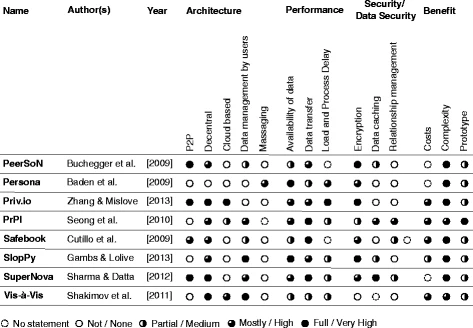Priv.io
(Redirected from Priv.io (Zhang and Mislove, 2013))
Jump to navigation
Jump to search
A Priv.io is a Decentralized P2P-based Online Social Network that is a based on a browser-based computation and a decentralized cloud system.
- Context:
- Source code/Github Repo: https://github.com/LeoLiangZhang/Priv.io
- It was first developed by Zhang & Mislove (2013).
- It can include the following DOSN's services:
- Example(s):
- …
- Counter-Example(s):
- See: Decentralized Network, Decentralized Computing System, Decentralized Application, Distributed Network, Decentralized Clinical Trial, Online Social Network.
References
2017
- (Muller et al., 2017) ⇒ Andre Muller, Andre Ludwig, and Bogdan Franczyk (2017). "Data Security In Decentralized Cloud Systems – System Comparison, Requirements Analysis And Organizational Levels". In: SpringerOpen - Journal of Cloud Computing.
- QUOTE: The results of the comparison are summarized in Fig. 1. The solutions of the investigated concepts of PeerSoN (Buchegger et al., 2009), Priv.io (Zhang and Mislove, 2013), Safebook (Cutillo et al., 2011), and SuperNova (Sharma & Datta, 2012) are based on a peer-to-peer approach. The concepts PrPl (Seong et al., 2010), SlopPy (Gambs & Lolive, 2012), and Vis-à-Vis (Shakimov et al., 2011) are based on distributed applications and on server solutions as well as cloud solutions that are self-managed by the user. As a common ground of these concepts, all parties are expected to run and manage their own cloud system. The eight already mentioned systems will now be explained shortly and examined with regard to their currently unsolved problems.

|
2013
- (Zhang & Mislove, 2013) ⇒ Liang Zhang, and Alan Mislove (2013) "Building Confederated Web-based Services with Priv.Io". In: Proceedings of the First ACM Conference on Online Social Networks.
- QUOTE: The result is that cloud services can be practically used today to provide storage, bandwidth, and messaging, but not computation. Our insight in Priv.io is to use the user's Web browser to provide the computation needed while they use Priv.io. Doing so provides a number of benefits: Using a user's Web browser for computation reduces costs (since users do not need to purchase computation), reduces security concerns (since content is encrypted in the browser, no third-party sees unencrypted content), and is practical (since most cloud providers allow storage and messaging services to be accessed via HTTP). However, only using browser-based computation also presents a few challenges: it results in a system where users are not always online (if a user does not have an browser window open to Priv.io, computation cannot be done on their behalf) and only provides a restricted model of computation (browser JavaScript is sandboxed, and cannot access the local disk or have unfettered access to the networking stack).